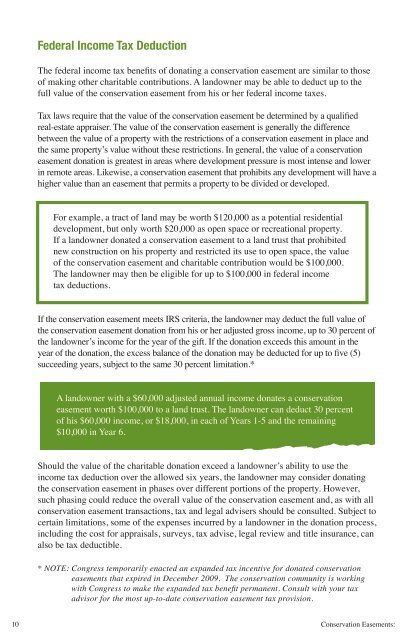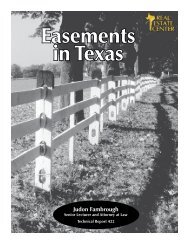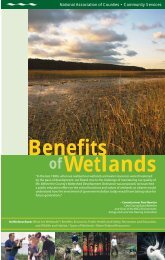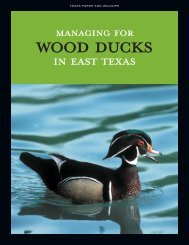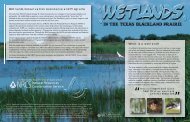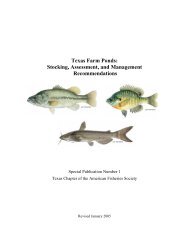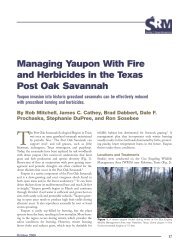Conservation Easements, A Guide for Texas Landowners
Conservation Easements, A Guide for Texas Landowners
Conservation Easements, A Guide for Texas Landowners
You also want an ePaper? Increase the reach of your titles
YUMPU automatically turns print PDFs into web optimized ePapers that Google loves.
Federal Income Tax Deduction<br />
The federal income tax benefits of donating a conservation easement are similar to those<br />
of making other charitable contributions. A landowner may be able to deduct up to the<br />
full value of the conservation easement from his or her federal income taxes.<br />
Tax laws require that the value of the conservation easement be determined by a qualified<br />
real-estate appraiser. The value of the conservation easement is generally the difference<br />
between the value of a property with the restrictions of a conservation easement in place and<br />
the same property’s value without these restrictions. In general, the value of a conservation<br />
easement donation is greatest in areas where development pressure is most intense and lower<br />
in remote areas. Likewise, a conservation easement that prohibits any development will have a<br />
higher value than an easement that permits a property to be divided or developed.<br />
For example, a tract of land may be worth $120,000 as a potential residential<br />
development, but only worth $20,000 as open space or recreational property.<br />
If a landowner donated a conservation easement to a land trust that prohibited<br />
new construction on his property and restricted its use to open space, the value<br />
of the conservation easement and charitable contribution would be $100,000.<br />
The landowner may then be eligible <strong>for</strong> up to $100,000 in federal income<br />
tax deductions.<br />
If the conservation easement meets IRS criteria, the landowner may deduct the full value of<br />
the conservation easement donation from his or her adjusted gross income, up to 30 percent of<br />
the landowner’s income <strong>for</strong> the year of the gift. If the donation exceeds this amount in the<br />
year of the donation, the excess balance of the donation may be deducted <strong>for</strong> up to five (5)<br />
succeeding years, subject to the same 30 percent limitation.*<br />
A landowner with a $60,000 adjusted annual income donates a conservation<br />
easement worth $100,000 to a land trust. The landowner can deduct 30 percent<br />
of his $60,000 income, or $18,000, in each of Years 1-5 and the remaining<br />
$10,000 in Year 6.<br />
Should the value of the charitable donation exceed a landowner’s ability to use the<br />
income tax deduction over the allowed six years, the landowner may consider donating<br />
the conservation easement in phases over different portions of the property. However,<br />
such phasing could reduce the overall value of the conservation easement and, as with all<br />
conservation easement transactions, tax and legal advisers should be consulted. Subject to<br />
certain limitations, some of the expenses incurred by a landowner in the donation process,<br />
including the cost <strong>for</strong> appraisals, surveys, tax advise, legal review and title insurance, can<br />
also be tax deductible.<br />
* NOTE: Congress temporarily enacted an expanded tax incentive <strong>for</strong> donated conservation<br />
easements that expired in December 2009. The conservation community is working<br />
with Congress to make the expanded tax benefit permanent. Consult with your tax<br />
advisor <strong>for</strong> the most up-to-date conservation easement tax provision.<br />
10 <strong>Conservation</strong> <strong>Easements</strong>:


